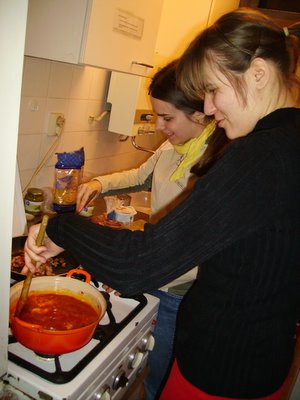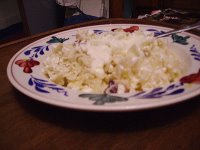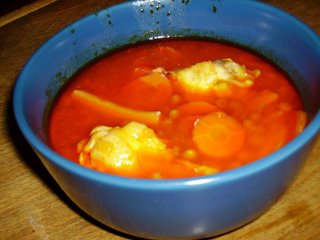 Ildi is the first person I have actually met who has had her eyes lasered. She jokes with her high-school friend Andrea about walking around with sunglasses for half a year afterwards and getting strange looks at night. They tell me Hungary is the up-and-coming destination for laser and dental "tourism", because of the quick service and cheap prices.
Ildi is the first person I have actually met who has had her eyes lasered. She jokes with her high-school friend Andrea about walking around with sunglasses for half a year afterwards and getting strange looks at night. They tell me Hungary is the up-and-coming destination for laser and dental "tourism", because of the quick service and cheap prices.Andrea (in black) and Ildi are both language students from Budapest. Andrea studies Dutch and English and is improving her Dutch by staying in the Netherlands for 8 months. She works as a teacher's assistant at a school for security agents.
Ildi is visiting, she studies Japanese and English, but has not been to Japan yet...now Hungary is part of the European Union, there might be more possibilities for exchange programs. Andrea is obviously very fond of Ildi, but jokes she just likes having her around so she can wear her hair in two ponytails; Ildi makes the perfectly straight part in the back!
Some of the ingredients for tonight's meal were especially brought over from Budapest. A bag of pasta named fodros nagykocka after 'ruffles' because of their shape, carrots, 'white carrots' and some real Hungarian paprika powder, supposedly the essential ingredient in traditional soups and stews.
 And last but not least: a candy bar with chocolate and cottage cheese called Túró Rudi. According to Andrea this will be all the rage in Europe within a year, and when I google the name of this delicatessen I find out she has a point! I didn't know people could be so fanatic about a bar of chocolate.
And last but not least: a candy bar with chocolate and cottage cheese called Túró Rudi. According to Andrea this will be all the rage in Europe within a year, and when I google the name of this delicatessen I find out she has a point! I didn't know people could be so fanatic about a bar of chocolate. Ildi's dish, the túrós csusza (at left), is really simple to make: just the frilly pasta with a sauce of drained cottage cheese and salty bacon bits. And a dollop of sour cream on top. A kind of "pasta carbonara", I guess.
Ildi's dish, the túrós csusza (at left), is really simple to make: just the frilly pasta with a sauce of drained cottage cheese and salty bacon bits. And a dollop of sour cream on top. A kind of "pasta carbonara", I guess.I'm missing some veggies though. But Andrea's pea soup, borsóleves (at right), with fried chicken wings, carrots
 and 'white carrots' (the official word is parsnip) takes care of that.
and 'white carrots' (the official word is parsnip) takes care of that.The soup is Andi's mix of traditional pea soup with the basis of most Hungarian stews: onions fried in oil till they disintegrate, plus paprika powder. The powder gives the soup it's distinctive taste and red colour.
What else is typically Hungarian, I ask. "Poppy seeds!", answers Ildi. "We mostly used them in cakes. Officially you're not allowed to grow poppies in your garden, because the green seed pod contains the ingredients for opium. But they still grow everywhere. When my grandmother was small, she once ate some green poppies from a field."
"What happened?", I ask.
"She slept for three days straight! The doctor came and told her parents:"Just let her sleep...", and afterwards she was okay."
"Wow!" I exclaim, "and I thought Holland was special, with marihuana plants growing in gardens and on balconies..."
Then Andrea tells me about an old lady who made the news in Hungary because of her marihuana plants. She planted them between her cabbages, supposedly to keep the worms away. The police had to force her to remove the plants. But the next year, she did it again. And made the news again. According to Andrea and Ildi, this was just a smart way of making publicity. You have to let people know you are selling wormless cabbages somehow...
Ildi has been to the States to visit family. She has two uncles living there who both fled their country in 1956 because of the anti-Soviet Hungarian Revolt. They're in their seventies now and even speak Hungarian with an American accent after all these years. The story goes that the oldest brother crossed the border by hanging onto the underside of a train for a couple of kilometers!
It reminds me of how my own great-grandmother is supposed to have escaped from the Ukraine hidden in a haywagon. Crossing borders makes for interesting stories...but maybe time passing makes them even more interesting!
No comments:
Post a Comment